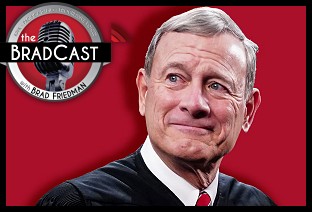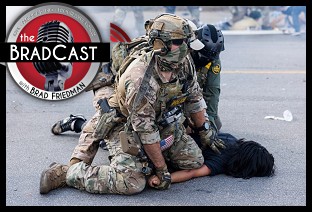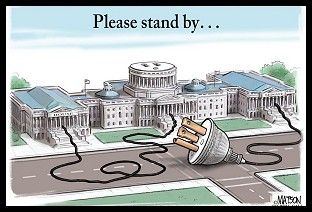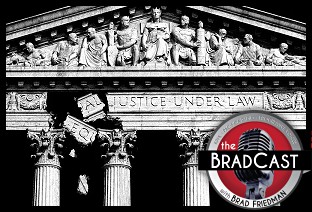READER COMMENTS ON
"Romney Hopes to Bork the Courts"
(22 Responses so far...)
COMMENT #1 [Permalink]
...
Czaragorn
said on 4/27/2012 @ 2:09 pm PT...
This makes me want to Bork!
COMMENT #2 [Permalink]
...
Dredd
said on 4/27/2012 @ 2:32 pm PT...
And this at a time when the federal courts are more right-wing than at any time since ~1937.
COMMENT #3 [Permalink]
...
julie
said on 4/27/2012 @ 6:49 pm PT...
Thank you, Mr. Canning. Even the most disillusiouned previous supporter of Obama (which I am not, but I know of many who failed to realize that "Change We Can Believe In" is not a spectator sport) needs to take heed of what you are saying and make sure that the Supreme Court is not taken over by Federalist Society sociopaths for generations to come. I always find your articles to be inspiring in their logic and well-thought reason.
COMMENT #4 [Permalink]
...
zapkitty
said on 4/27/2012 @ 7:21 pm PT...
I'm sure it would be a nightmare.
I'm just as sure that a reselected Obama will be just as much of a nightmare even without Bork.
Obama has, is and will continue to be able to commit obcenities against average citizens on behalf of the <1% that a GOP president could never dream of getting away with.
Whoever wins, we lose:
http://fdlaction.firedog...ronmental-laws-near-you/
But I refuse to give in to the terrorists
again: I will vote third party (Diebold willing).
COMMENT #5 [Permalink]
...
Dan-In-PA
said on 4/28/2012 @ 9:08 am PT...
A vote for 3rd party in THIS election is a vote for Romney. Period.
Fucking firebaggers make me so god damned angry. How can anyone be so politically naive.
COMMENT #6 [Permalink]
...
Dan-In-PA
said on 4/28/2012 @ 9:11 am PT...
But hey, I would expect as much from a so-called progressive organization that willingly hopped in bed with Grover Norquist
COMMENT #7 [Permalink]
...
Brad Friedman
said on 4/28/2012 @ 12:51 pm PT...
Dan-in-PA -
Allow me to risk incurring your wrath, my friend, to respond to two of your points at #5 and #6 above.
First, while I heartily, if respectfully disagree with our other friend ZapKitty's over-generalization at #4, re: "a reselected Obama will be just as much of a nightmare even without Bork," I similarly disagree with your argument that "A vote for 3rd party in THIS election is a vote for Romney. Period."
By way of just one example, let's say one lives in a very Democratic-leaning state, such as Vermont or California. In such a case, a vote for a 3rd Party there is actually a vote for the 3rd Party to receive more money and support in future elections, among other things.
Secondly, you wrote: "I would expect as much from a so-called progressive organization that willingly hopped in bed with Grover Norquist"
(Here's the "risk incurring your wrath" part.) I'd do the same! In a second! If Norquist, for example, wanted to come out against unverifiable e-voting, or against polling place Photo ID restrictions, I'd be delighted to "hop in bed" with him to partner against those things!
That's how politics works (or is supposed to.) I don't recall what Jane and Grover were partnering on. But I do recall folks being mad at her about it, even as I recall thinking how smart she was to do it at the time!
Have I incurred your wrath?
COMMENT #8 [Permalink]
...
zapkitty
said on 4/28/2012 @ 4:38 pm PT...
... Brad Friedman said...
"That's how politics works (or is supposed to.) I don't recall what Jane and Grover were partnering on."
They cosigned a letter calling on the AG to investigate Rahm Emanuel's crony bullshit while he was on the board of Freddie Mac. It was an attempt to call out and delay one of Obama's signature transfers of massive amounts of public funds to corporate coffers amidst the usual fraud and deception.
As you say, very standard politics and you can find a myriad of such letters on file in D.C. archives with signatures by mortal enemies side-by-side.
But... this was back in the halcyon days of 2009 when only some on the left were just starting to realize that Obama had them over a barrel and wasn't even using lube.
Jane and the FDL crew had been doing yeoman work documenting the then-ongoing sellout on the health care insurance company bailout bill and this letter gave the kossacks, huffpo's and DUs an excuse to demonize critics of Obama the "extreme left."
As you can see from Dan's example that tactic seems to have worked well some cases 
Wonder what Dan would think of a number of such political letters signed by the ACLU and Norquist...
COMMENT #9 [Permalink]
...
zapkitty
said on 4/28/2012 @ 5:01 pm PT...
... Dan-In-PA said...
"A vote for 3rd party in THIS election is a vote for Romney. Period."
Hmmm... "THIS election?" Sorry, you can't plead a special case for this particular election.
By your logic, a vote for third party in ANY U.S. election is a vote for the one side or the other of the duopoly.
By your logic: if I do not want to
vote for:
Executive-authorized wars disguised as "kinetic actions"
The assasination of American citizens without charge or trial
The constant growth of the security state
-matched with-
The constant erosion of civil liberties
The continuing empowerment and
enrichment of the <1%
-matched with-
The gutting of the social contract and safety net.
... oh, the list is so much longer, but time is short...
According to you... even if I don't want to vote for the above I don't have a choice because Romney will be worse?
Do you recall the definition of terrorism? Or at least do you know what a protection racket is?
"Fucking firebaggers make me so god damned angry. How can anyone be so politically naive."
How naive is it to think that Obama will suddenly stop shoving his nose into the nearest billionaire's ass crack after he is reselected?
He's not the "lesser" of two evils... he's the more effective of two evils.
COMMENT #10 [Permalink]
...
zapkitty
said on 4/28/2012 @ 5:33 pm PT...
... Brad Friedman said...
First, while I heartily, if respectfully disagree with our other friend ZapKitty's over-generalization at #4, re: "a reselected Obama will be just as much of a nightmare even without Bork,"
I think that the slow, deliberately calculated poison inflicted by Obama is much more damaging, when averaged over time.
That is why I can not and will not vote for him again.
And even if Romney is selected (unlikely, Obama has been too useful a tool for the <1% to discard just yet) look at the results where reich-wingers took the 2010 midterms, a classic rebuff of Dem inaction on issues important to the voters, as a signal instead to go in a rampage against... well against just about everything. They will be paying dearly for those overreaches come November.
Romney would not be allowed to make that grievous an error, true, but he will be forced to act with greater haste than Obama in implementing the wishes of the <1%... and we'll have a better chance to see exactly what's coming next.
And, most importantly, the numbers of third party voters will be growing and that growth counted (Diebold willing).
COMMENT #11 [Permalink]
...
Ernest A. Canning
said on 4/28/2012 @ 8:36 pm PT...
Zap @various.
I respect your personal decision to vote third party, but:
1) At this point, I do not see a realistic prospect that any third party candidate has any chance of prevailing in 2012? (Certainly if you can cite something beyond your own preferences that indicates otherwise, we'd all welcome that information.)
2) Your cavalier suggestion that a 2d Obama administration would "be as much of a nightmare" as Romney/Bork ignores the post-2010 reality that:
a) Only the GOP/Koch/ALEC has been behind the vast array of voter suppression laws;
b) Only the GOP is behind union busting;
c) Only the GOP is behind climate science denial;
d) Only the GOP supports the Federalist Society and its radical, reactionary agenda;
e) Only the GOP is behind the calls to dismantle the EPA.
I could go on, and on.
Your appropriate revulsion towards many of the betrayals of the 99% by the Obama WH has, unfortunately, blinded you to the very real danger that a Romney presidency could not only hasten a fascist plutocracy, but permanently close any window of opportunity the 99% have to peacefully achieve a democratic society. And, given the potential that climate change could be irreversible, ignoring those stark differences could very well prove fatal to the survival of our species.
COMMENT #12 [Permalink]
...
David Lasagna
said on 4/29/2012 @ 8:40 am PT...
I would like to thank the paradoxical nature of the universe for making it possible for me to be in complete agreement with both Zapkitty and Ernie on this one.
ps.(off topic) I wrote a little journal entry at okcupid about the the close-mindedness of Fox News fans. Generated a bit of a hubbub. For the first time in my life I deleted and blocked someone and threatened to do it to another. Responded to many of the comments. Brad, I don't know how you do this on a regular basis. It requires a lot of time, attention, and effort. A LOT! It's HARD!!! Then again you're better at it than I, so maybe it's not QUITE so hard for you. Anyhoo, it reput me in awe and admiration of you. What you and Ernie provide us here is beyond the pale in worth.
COMMENT #13 [Permalink]
...
Dan-In-PA
said on 4/30/2012 @ 6:16 am PT...
Let me start off by apologizing for the harsh language. My point could have been made just as relevantly without cursing.
Secondly, much of the "outrage" over Obama betrayals comes from Drudge designed headlines. Here in the "Western World", I have come to realize that we are living with the largest, most effective, best funded propaganda network ever devised by mankind.
There was great outrage when Obama signed the NDAA that included wording that codified in law indefinite detention. But that was just the headlines. The president explained quite clearly that he found the wording of that section of the law unacceptable and demanded it be re-written. To those who did no research on that piece of shit, the Senate had included wording that MANDATED military detention for suspected terrorists. In other words, the appropriations bill for military pay and veterans benefits violated the posse comitatus statute. The Senate meekly reworded that to allow for civilian law enforcement detention. A meek compromise, but when it comes to law, words really do matter. Could Obama have vetoed that? Sure...at a huge political price because it would have stranded millions of our American vets and active military without pay or benefits for a period.
But I don't blame the president for that....I blame congress.
The outrage machine was in overdrive for mundane legislation too. Remember the outrage generated when "Obama authorized Horse Slaughter"?
5 minutes of research took me to the horse industry to find that horse slaughter, which had been outlawed in the 90's was still taking place. Only it was being done by shipping horses to Mexico and Canada, where there were no guarantees of humane slaughter. So this legislation actually filled a niche by allowing a necessary action while encoding in that law that it be done as humanely as possible. It was the horse industry that pushed for this legislation and they made a very good case. But all the headlines carried was outrage. And all my progressive friends echoed that outrage. Congress actually did it's job here, but the conservative echo chamber worked marvelously by ensuring all the headlines were designed to evoke outrage.
I blame Drudge.
President Obama's executive order that defined military control of resources? Another outrage generator. Yet, 5 minutes of research again showed that Bush II, Clinton, Carter, Reagan even Eisenhower signed very similar executive orders. That's because the 1950 legislation mandates the executive branch to protect and preserve American resources for use by America during any national emergency. Cold war legislation, written with a Russian invasion in mind, that has required modernized interpretation by presidents, since it's passage.
But all the headlines said the same thing..."OBAMA'S TAKING OUR STUFF!!!!"
Again, I blame Drudge, headlines like that are written specifically to evoke outrage.
If you think that media outlets today are not working overtime to drive a wedge between different factions of the traditional democratic base, then you are being extremely naive.
As far as the war on drugs is concerned, if you read and understood Ernest's great 3 part series, then you would grasp that the CIA/NSA Black hat brigade has that locked up tight. Not even Ron Paul could affect that. That faction of our government wields real power. And is not always aligned with the civilian portion of our government. And they have made people disappear, both here and abroad, when efforts have been made to rein them in.
Yeah, I think Holder's a tool. Yeah, I think Obama's been too timid, yeah, I hate indefinite detention.
But to lay all of your outrage on this president is both ignorant and naive. Hate indefinite detention? Then lobby congress to repeal the AUMF and end the horrific War on terror. because all the authority for indefinite detention comes from THAT.
And Brad, I'm sorry, but I disagree with you in re THIS election. I base my assertions on my social network feeds and the outrage expressed by the many people from the Drudge inspired propaganda feed that I personally believe is being directly targeted at "the professional left" with the intended purpose of splitting the base and directing as many of those voters into the Ron Paul camp. That's exactly what my social network feeds tell me. These people with whom I share a great deal in common, are uniformly expressing support for Ron Paul. All they need do is peel enough disenchanted democrats away from Obama in 2 or 3 key states while the base votes in lockstep for Romney and this election is turned.
I could tolerate a Ron Paul presidency, the GoP in congress would never get behind his agenda. I can tolerate another Obama term, he has done much that I appreciate.
But to me, the focus of THIS general election really needs to be in renouncing the Corporate-Conservative (GoP and Dem) congressional power base. That Zapkitty and the Firebrigade publicly renounce Obama while never holding our legislative branch to account for some very shitty legislation is not just wrong or naive, to me it's extremely dangerous. I think there are evil intentions behind these outrage evoking headlines and that the outrage is being generated by the most massive yet subtle propaganda machine ever assembled.
And that's where I'm coming from. This election needs to be about a truly un-American Congress.
But a Romney presidency, to me, for the reasons well outlined above by Ernest and more, would be tragic on global proportions. That prospect, literally, scares the living shit out of me.
COMMENT #14 [Permalink]
...
Dredd
said on 4/30/2012 @ 7:05 am PT...
Don't forget that the White House with Obama at the helm is awarding The Medal of Freedom to Bob Dylan.
That takes some social balls.
COMMENT #15 [Permalink]
...
Charlie L
said on 4/30/2012 @ 11:31 am PT...
Yes, at some times (well, I guess you could say at ALL times) the competition for President does look like a fight between a douche and a turd sandwich.
But, you know, really, a douche, while not the best possible choice for a POTUS is actually a more appetizing and potentially useful choice than a turd sandwich. Perfect? No, far from it. Good? Well, maybe not even that positive. But downright evil and 100% sold out to the corporate/fascist 1%? No.
Obama has made many deals with the devil(s) to get elected and to attempt to get re-elected. Am I happy about those? No.
Do I think that Romney would make even more and much WORSE deals with the same devils upon his election? YES. And I really don't think we can afford them.
I will vote for Obama while holding my nose, as I have nearly every time I have voted for a Democrat in a presidential election. And hey, maybe my vote will even be COUNTED for Obama, who knows.
He has some some good things. He has done some bad things. He has done some downright HORRIBLE things. But, in the end, he is better than the alternative, and in a simple, two-party system, THAT IS THE ONLY CHOICE WE ARE GIVEN.
I can WISH that I had a better choice to make, but that doesn't make it so. I'm a grown up, and have to confront the choice before me. I can fight for a better system in a thousand ways, but when the choice is before me, that is the choice before me, and not acknowledging it doesn't change it.
COMMENT #16 [Permalink]
...
GoinGreenie
said on 5/3/2012 @ 4:11 am PT...
No way I vote for someone who is unqualified to be president,
http://www.washingtontim...ficate-forgery/?page=all
and who claims to be a Constitutional scholar yet has decimated the Constitution. This eliminates Obama for me.
At the other end of the spectrum we have the Herzog/Romney/Jeb Bush connection, via the White Hats Report #39 and #40.
http://tdarkcabal.blogsp...hite-hats-report-39.html
http://tdarkcabal.blogsp...hite-hats-report-40.html
Which leaves only one guy to vote for.
http://youtu.be/tjBDb293nPc
Votes for Romney, Obama give continued consent to corruption, treason, psychopathy, undeclared wars, fema camps, Bankster Heist, MSM douchbags, 450 million DHS Agency "hollow points for AMERICAN CITIZENS", warrant-less spying, and state secret abuse.
I would rather face civil war than to give continued consent to such treason, theft and murder. These aren't people I'd to vote for, these are domestic terrorists who belong in prison.
COMMENT #17 [Permalink]
...
GoinGreenie
said on 5/3/2012 @ 4:22 am PT...
People who blame Drudge are misdirecting anger, Drudge consists of MSM stories all compiled in one location. IT's a GIANT RSS Feed without the RSS. A Splog. It's like blaming RAW Story as a whole for one radical author's article you hate.
You want to blame someone, focus your blame at the FCC, CAFR money, and the MSM.
My opinion is you have NOT looked into these yourself.
COMMENT #18 [Permalink]
...
GoinGreenie
said on 5/3/2012 @ 4:35 am PT...
COMMENT #19 [Permalink]
...
Dan-In-PA
said on 5/3/2012 @ 7:41 am PT...
Not once does GoinGreene ever mention a thoroughly bought and paid for congress. The originating source of all legislation and the keepers of America's purse strings.
You really don't get it, your comments prove that by displaying an ignorance on basic civics in America that underscores the all too easy job of the propaganda mill that runs through our eyes and ears 24×7x365.
Drudge is much more than an RSS feed, Drudge is a vital cog in the corporate corrupted echo chamber. But I merely use Drudge as a symbol for a much, much wider propaganda machine. You dismiss the effects of that constant stream of propaganda all too easily.
COMMENT #20 [Permalink]
...
Dan-In-PA
said on 5/3/2012 @ 9:10 am PT...
One need look no further than the Sibel Edmonds' story to see the rampant corruption of congress and the complicity of the vast American propaganda machine to understand how politicians are manipulated, voices of dissent squashed and the American people kept woefully uninformed or misinformed to further the cause of the fascist state.
Marc Grossman, #3 at State Department during Sibel's tenure at FBI, was deeply implicated in the sale of American Nuclear technology to foreign (Turkish, Israeli and even Pakistani agents) is still working for the State Dept:
http://www.emptywheel.ne...-as-breakthrough-neared/
Here is how Pakistan Today described the current situation:
Intense negotiations between US Special Envoy Marc Grossman and Pakistan’s civilian and military leadership have finally paved the way for the reopening of blocked NATO supplies and release of arrears under the Coalition Support Fund (CSF) by Washington, and a breakthrough in this regard is likely in a day or two, Pakistan Today learnt on Sunday.
What the fuck is Marc Grossman doing still working for our government? Because the media won't report his treason.
But the ONLY reason Sibel's story is now coming out is THIS PRESIDENT. That point is worth remembering.
Anyone who focuses all their anger and ire at this president for a US Government that has been severely compromised, is missing the much bigger picture.
COMMENT #21 [Permalink]
...
Brad Friedman
said on 5/3/2012 @ 7:59 pm PT...
GoinGreenie @ 17 said:
People who blame Drudge are misdirecting anger, Drudge consists of MSM stories all compiled in one location. IT's a GIANT RSS Feed without the RSS.
Wrong. An RSS Feed takes all stories that come up from a particular source or on a specific topic. Drudge is curated to highlighted very specific things and hide others. I'm quite certain you know that.
COMMENT #22 [Permalink]
...
Brad Friedman
said on 5/3/2012 @ 8:07 pm PT...
GoingGreenie @ 16 whiffed:
No way I vote for someone who is unqualified to be president,
http://www.washingtontim...ficate-forgery/?page=all
You may vote for whoever you like, of course. But if your source for determining that he is "unqualified to be president", is Joe Arpaio and the Washington Times, it might suggest you're unqualified to make such an important judgement on who should be President of the United States.
Which leaves only one guy to vote for.
http://youtu.be/tjBDb293nPc
Not sure if you've heard, but it doesn't look like your guy, Ron Paul, is actually going to be on the ballot this year. In the event that he is not, does that mean you are not planning to vote? Or that you'll be writing in Ron Paul?
Either way, if you're against things like "consent to corruption, treason, psychopathy...Bankster Heist, MSM douchbags," Ron Paul may not be your guy either. Last check, he's pretty much in favor of leaving you --- yes, you, pretty much by yourself --- to combat those things while giving the "Banksters" and "MSM douchbags" to do as they wish with no oversight whatsover, ever, in any regard. Sound good?
 "If we play Russian Roulette with the Supreme Court," Sen. Edward Kennedy (D-MA) said during the Clarence Thomas confirmation hearings, "if we confirm a nominee who has not demonstrated a commitment to core constitutional values, we jeopardize our rights as individuals and the future of our nation."
"If we play Russian Roulette with the Supreme Court," Sen. Edward Kennedy (D-MA) said during the Clarence Thomas confirmation hearings, "if we confirm a nominee who has not demonstrated a commitment to core constitutional values, we jeopardize our rights as individuals and the future of our nation."

 Trump Labor Dept. Warns Trump Policies Sparking Food Shortage, Farmworker Crisis: 'BradCast' 10/9/25
Trump Labor Dept. Warns Trump Policies Sparking Food Shortage, Farmworker Crisis: 'BradCast' 10/9/25 'Green News Report' 10/9/25
'Green News Report' 10/9/25
 Trump's Losing Battles: 'BradCast' 10/8/25
Trump's Losing Battles: 'BradCast' 10/8/25 'Supreme Arrogance': Trump, John Roberts and His Stacked, Packed and Captured SCOTUS: 'BradCast' 10/7/25
'Supreme Arrogance': Trump, John Roberts and His Stacked, Packed and Captured SCOTUS: 'BradCast' 10/7/25 'Green News Report' 10/7/25
'Green News Report' 10/7/25 Trump Attempting His
Trump Attempting His Sunday 'Shutshow' Toons
Sunday 'Shutshow' Toons Biden Budget Expert: Mass Firings in Shutdown 'Extremely Illegal': 'BradCast' 10/2/25
Biden Budget Expert: Mass Firings in Shutdown 'Extremely Illegal': 'BradCast' 10/2/25 'Green News Report' 10/2/25
'Green News Report' 10/2/25 Why is DOJ Suing 'Blue' States for Their Voter Databases?: 'BradCast' 10/1/25
Why is DOJ Suing 'Blue' States for Their Voter Databases?: 'BradCast' 10/1/25 'A War from Within' Trump's Twisted Mind: 'BradCast' 9/30/25
'A War from Within' Trump's Twisted Mind: 'BradCast' 9/30/25 'Green News Report' 9/30/25
'Green News Report' 9/30/25 'Fear is the Tool of a Tyrant':
'Fear is the Tool of a Tyrant': Sunday 'Long Arm/Small Man' Toons
Sunday 'Long Arm/Small Man' Toons 'Green News Report' 9/25/25
'Green News Report' 9/25/25 I Don't Know What This Means, But I Thought You Should Know: 'BradCast' 9/25/25
I Don't Know What This Means, But I Thought You Should Know: 'BradCast' 9/25/25 Gov't Shutdown Looms as Dems Fight to Save Healthcare Subsidies: 'BradCast' 9/24/25
Gov't Shutdown Looms as Dems Fight to Save Healthcare Subsidies: 'BradCast' 9/24/25 Updates: Homan Bribery; Kimmel Censorship; Our Insane Prez at U.N.: 'BradCast' 9/23/25
Updates: Homan Bribery; Kimmel Censorship; Our Insane Prez at U.N.: 'BradCast' 9/23/25 Trump 'Border Czar' Took $50k in Sting, DOJ Dropped the Case: 'BradCast' 9/22/25
Trump 'Border Czar' Took $50k in Sting, DOJ Dropped the Case: 'BradCast' 9/22/25 MAGA Exploiting Kirk's Death as Their 9/11: 'BradCast' 9/17/25
MAGA Exploiting Kirk's Death as Their 9/11: 'BradCast' 9/17/25 Our Crumbling Courts and Withering Rule of Law: 'BradCast' 9/16/25
Our Crumbling Courts and Withering Rule of Law: 'BradCast' 9/16/25 After Kirk Murder, 1st Amendment, Not 2nd, Under Attack: 'BradCast' 9/15/25
After Kirk Murder, 1st Amendment, Not 2nd, Under Attack: 'BradCast' 9/15/25 SCOTUS Suspension of 4th Amendment an Ominous Threat to Constitutional Republic
SCOTUS Suspension of 4th Amendment an Ominous Threat to Constitutional Republic
 VA GOP VOTER REG FRAUDSTER OFF HOOK
VA GOP VOTER REG FRAUDSTER OFF HOOK Criminal GOP Voter Registration Fraud Probe Expanding in VA
Criminal GOP Voter Registration Fraud Probe Expanding in VA DOJ PROBE SOUGHT AFTER VA ARREST
DOJ PROBE SOUGHT AFTER VA ARREST Arrest in VA: GOP Voter Reg Scandal Widens
Arrest in VA: GOP Voter Reg Scandal Widens ALL TOGETHER: ROVE, SPROUL, KOCHS, RNC
ALL TOGETHER: ROVE, SPROUL, KOCHS, RNC LATimes: RNC's 'Fired' Sproul Working for Repubs in 'as Many as 30 States'
LATimes: RNC's 'Fired' Sproul Working for Repubs in 'as Many as 30 States' 'Fired' Sproul Group 'Cloned', Still Working for Republicans in At Least 10 States
'Fired' Sproul Group 'Cloned', Still Working for Republicans in At Least 10 States FINALLY: FOX ON GOP REG FRAUD SCANDAL
FINALLY: FOX ON GOP REG FRAUD SCANDAL COLORADO FOLLOWS FLORIDA WITH GOP CRIMINAL INVESTIGATION
COLORADO FOLLOWS FLORIDA WITH GOP CRIMINAL INVESTIGATION CRIMINAL PROBE LAUNCHED INTO GOP VOTER REGISTRATION FRAUD SCANDAL IN FL
CRIMINAL PROBE LAUNCHED INTO GOP VOTER REGISTRATION FRAUD SCANDAL IN FL Brad Breaks PA Photo ID & GOP Registration Fraud Scandal News on Hartmann TV
Brad Breaks PA Photo ID & GOP Registration Fraud Scandal News on Hartmann TV  CAUGHT ON TAPE: COORDINATED NATIONWIDE GOP VOTER REG SCAM
CAUGHT ON TAPE: COORDINATED NATIONWIDE GOP VOTER REG SCAM CRIMINAL ELECTION FRAUD COMPLAINT FILED AGAINST GOP 'FRAUD' FIRM
CRIMINAL ELECTION FRAUD COMPLAINT FILED AGAINST GOP 'FRAUD' FIRM RICK SCOTT GETS ROLLED IN GOP REGISTRATION FRAUD SCANDAL
RICK SCOTT GETS ROLLED IN GOP REGISTRATION FRAUD SCANDAL VIDEO: Brad Breaks GOP Reg Fraud Scandal on Hartmann TV
VIDEO: Brad Breaks GOP Reg Fraud Scandal on Hartmann TV RNC FIRES NATIONAL VOTER REGISTRATION FIRM FOR FRAUD
RNC FIRES NATIONAL VOTER REGISTRATION FIRM FOR FRAUD EXCLUSIVE: Intvw w/ FL Official Who First Discovered GOP Reg Fraud
EXCLUSIVE: Intvw w/ FL Official Who First Discovered GOP Reg Fraud GOP REGISTRATION FRAUD FOUND IN FL
GOP REGISTRATION FRAUD FOUND IN FL

































